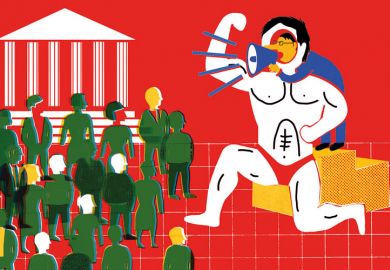Tomorrow’s universities are being reshaped as I write this. Next year’s students are already fundamentally different in attitude and mindset to those who were making their university choice just five years ago.
These students don’t want the “polished” version of what a university can offer and they don’t want a cookie-cutter response to their questions. The real experience of a university is already being created via social media forums.
This is why, if universities continue using traditional means of marketing themselves, they risk becoming faceless or – worse still – irrelevant.
In a world where league tables often act as judge, jury and executioner, universities need to delve deep into their hearts and define unique facets that will resonate with an increasingly savvy and critical audience.
This communication of what makes a university less like educational wallpaper and more “just what I was looking for” comes from many elements that are all within a university’s power to improve.
Looking at the current maturity of universities’ digital brands shows a remarkable opportunity for the forward thinkers and an established order waiting to be upset. As with so many other markets, those who master the ability to connect will reap benefits and those Luddites that don't will slip into irrelevance.
We identified five key states of university brands in a hyperconnected world and we set out to gain a clearer picture not just of the current situation, but, more importantly, of what needs to be done to turn the existing digital apathy into a transformative force for change.
Business as Usual defines those who regard digital as just another communications channel. This is where digital is used to disseminate print-based content in an unengaging digital format. The student’s experience here is one of having to bypass an awful lot of clutter on their way to choosing the right establishment.
The Wrapper is the next stage on. This is where digital brands are being used to pull all the various silos together in a battle to provide coherence and clarity to the outside world. This tries to cure the proliferation of fragmented, incoherent messages, with an overabundance of websites, campaign sites and various social media handles as each stakeholder fights their corner.
Eighty per cent of universities fall in one or the other of these two states.
The Supercharger occurs as we move up the scale of efficient use of digital. We find brands that tailor their messages to wrap around and actually engage their audiences with the right story through the right channel. These are the university brands that genuinely communicate well with their audiences.
Even here, however, we are a long way off disrupting the sector in a truly dynamic way. This is still brand as broadcast, a far cry from brand using the full power of connectivity.
Which brings us to the fourth digital brand state, that of using brand as dialogue. This requires shifting away from the dictatorial “I” of brand and moving into what “you”, the student, want of the brand. In so doing we can move away from the current reliance on mass personalisation and use big data to craft tailored communications channels.
However, there is still a higher state of brand being. This is the fifth brand state, which occurs when connectivity is used to co-produce the brand.
By involving all stakeholders in the co-creation process , the university taps into their combined ambitions, wisdom and passions to define what the brand is about. This empowers the student to become part of the brand. This is using digital to revolutionise the way a brand is shaped, to transform it into something living and therefore fundamentally more powerful.
For a higher education organisation to thrive in an environment of change, spun ever faster by technology, what are the behaviours we should address to make best use of technology?
A change in attitude to assets and knowledge is a first step. The thriving university of the future will always retain its own unique approach to education but it should allow itself to be shaped by its audiences and to be responsive to society’s needs.
As terrifying as it may sound, relinquishing control is part of the necessary change in behaviour that a university needs to accept before being able to become a transformational organisation.
To evolve the digital maturity of a university means shifting away from siloed executions focused on a particular platform and getting involved, gathering insight and co-creating a living breathing brand that is relevant to the very people who will be using it because it was created by them.
In our experience, the focus needs to be on sharing rather than selling, joining the conversation rather than taking over the microphone. It is no longer about the individual, it is about the group as a whole and it is as far away from good old-fashioned persuasion as a marketing team can get.
This shift means universities generously handing over the reins and allowing their students and academics to use digital to converse rather than broadcast.
Max du Bois is executive director of Spencer du Bois.
Register to continue
Why register?
- Registration is free and only takes a moment
- Once registered, you can read 3 articles a month
- Sign up for our newsletter
Subscribe
Or subscribe for unlimited access to:
- Unlimited access to news, views, insights & reviews
- Digital editions
- Digital access to THE’s university and college rankings analysis
Already registered or a current subscriber?







